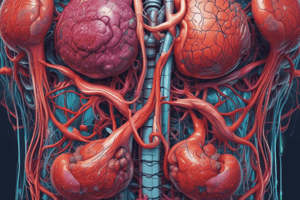Podcast
Questions and Answers
Which of the following describes a stimulus?
Which of the following describes a stimulus?
- Any factor in the environment that may trigger a nerve impulse (correct)
- The basic unit of the nervous system
- A reaction to a nerve impulse
- The time between a stimulus and a response
The nervous system includes the brain, spinal cord, and muscle cells.
The nervous system includes the brain, spinal cord, and muscle cells.
False (B)
What are the two main parts of the nervous system?
What are the two main parts of the nervous system?
Central nervous system and peripheral nervous system
Dendrites carry impulses towards the ______.
Dendrites carry impulses towards the ______.
Match the components of a neuron to their functions:
Match the components of a neuron to their functions:
What is the primary role of neurons?
What is the primary role of neurons?
Reaction time is the duration from the detection of a response to the application of a stimulus.
Reaction time is the duration from the detection of a response to the application of a stimulus.
How many neurons approximately exist in one part of the brain?
How many neurons approximately exist in one part of the brain?
Flashcards
Response
Response
A reaction to a stimulus.
Stimulus
Stimulus
Any factor in the environment that triggers a nerve impulse.
Reaction Time
Reaction Time
The time between a stimulus and the detection of a response.
Central Nervous System
Central Nervous System
Signup and view all the flashcards
Peripheral Nervous System
Peripheral Nervous System
Signup and view all the flashcards
Nerve Cell
Nerve Cell
Signup and view all the flashcards
Dendrites
Dendrites
Signup and view all the flashcards
Axon
Axon
Signup and view all the flashcards
Study Notes
Coordinated Functions of Nervous and Endocrine System
- The nervous and endocrine systems work together to maintain balance in the body
- Objectives include describing the nervous system, differentiating the roles of the nervous and endocrine systems, and recognizing the importance of coordinated functions in maintaining body balance
Sense Organs
- Sense organs constantly receive information from the environment and send messages to the brain
- These senses help in human survival
Stimuli vs Response
- Stimulus: Any environmental factor that triggers a nerve impulse
- Response: A reaction to the stimulus; messages do not travel in both directions along the same neuron
Reaction Time
- Reaction time is the time between applying a stimulus and detecting a response
Nervous System
- The nervous system includes the brain and spinal cord, and peripheral nerves
- Central nervous system (CNS) comprises the brain and spinal cord
- Peripheral nervous system (PNS) consists of nerves branching from the CNS
Nerve Cells
- Nerve cells, also called neurons, are the basic units of the nervous system
- Billions of neurons exist in the body, some independently, others forming organs like the brain and spinal cord
- A section of the brain alone contains 12-14 billion neurons
- Neurons process and signal information
- They relay and receive messages (impulses) between the brain and body, and within the brain and spinal cord
Nerve Cells (Detailed)
- Dendrites carry impulses towards the cell body (soma)
- Dendrites are tree-like extensions that increase the surface area of the cell body
- The cell body (soma) joins and passes signals from dendrites
- The nucleus does not directly transmit neural signals, but maintains the cell's functionality
- The axon carries impulses away from the cell body to the dendrites of other neurons or muscle cells
- Axons can combine electrical and chemical reactions to carry signals
Nerve Impulse
- A nerve impulse combines an electrical charge with a chemical reaction (not simply electricity)
- The impulse travels along a neuron but does not jump from one to another
- At the end of an axon, a chemical called neurotransmitter is released
- The chemical crosses the synapse (space between neurons) and stimulates the impulse to begin in the next dendrite
Studying That Suits You
Use AI to generate personalized quizzes and flashcards to suit your learning preferences.
Related Documents
Description
Explore the coordinated functions of the nervous and endocrine systems in this quiz. Understand how sense organs respond to stimuli and the importance of these systems in maintaining body balance. Test your knowledge about reaction times and the roles of various components of the nervous system.




